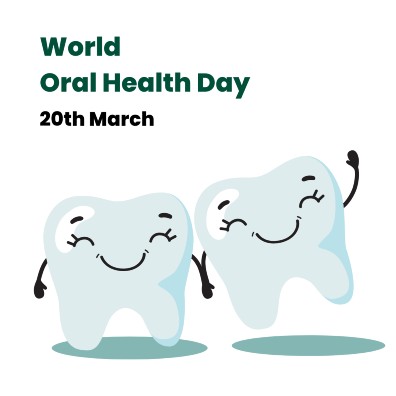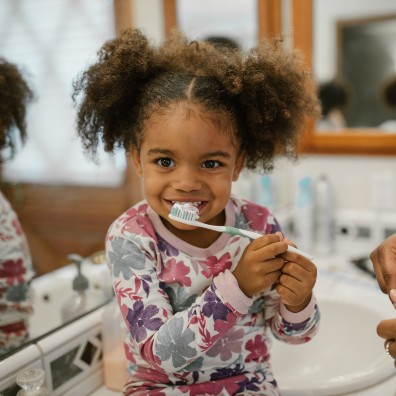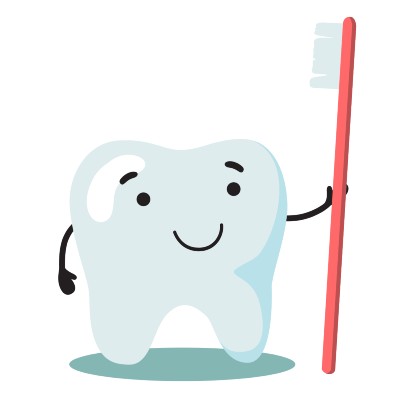By Registered Health Visitor – Julia Headland

Monday 20th March 2023 is World Oral Health Day 2023, and this marks the final year of a three year campaign set up in 2021 themed “Be Proud of Your Mouth”.
The campaign was set up by the World Dental Federation whose organisation it is to bring together the world of dentistry with the aim of achieving optimal oral health for everyone (FDI 2023).
The primary aims of the campaign are to:
• Inspire individuals to take personal action.
• To target schools and youth groups to deliver learning activities about oral health.
• To target health professionals and the wider healthcare community to educate the populations they serve.
• To Target governments and policymakers to champion better oral health for all (FDI 2023).
So why is oral health such a hot topic?
Did you know that oral health can be a determinant of physical health elsewhere in the body? Scientists already know that that there is a synergic relationship between oral health and overall wellness. Gum disease is linked to several illnesses including heart disease, diabetes, respiratory disease, osteoporosis and rheumatoid arthritis.
Studies reviewed by Colgate Global Scientific communications (2023) demonstrate just how closely oral health
and general health and wellbeing are intrinsically linked. If we look specifically at gum disease, research has shown us that unhealthy gums can negatively affect your health in many ways:
• Heart disease- the bacteria from inflammation of the gum disease can enter your bloodstream and travel to the arteries in the heart leading to Atherosclerosis-when plaque develops on and thickens your arteries inner walls, your blood flow is decreased through the body, leading to an increased risk of a heart attack or stroke.
• Endocarditis- the inner lining of the heart ( the endocardium) can also become infected and inflamed.
• Dementia-Gingivitis bacteria can enter your brain through nerve channels or the blood stream, possibly leading to Alzheimer’s disease.
• Respiratory infections- Inhaling bacteria from infected teeth and gums over a long period of time could lead to infections in the lungs, as well as pneumonia.
• Diabetic complications: Periodontal disease can make your blood sugar difficult to control and potentially make your diabetes worse. People with diabetes are also prone to periodontal disease making it a vicious cycle.
• Rheumatoid arthritis- the more tooth loss due to gum disease, the higher risk of rheumatoid arthritis

So how can we look after our children’s oral health from birth?
Many parents I speak with are blasé about their children’s first teeth as they feel that they will lose them anyway. Unfortunately, this has caused me to see young children with holes in their teeth, some so severe that they require them to be removed by the dentist. Baby teeth are so important because they help with speech and eating and even smiling. They also act as a guide for the permeant adult teeth to take position. This is why the guidelines state that it is important to brush your child’s teeth as soon as they come through. Please see below some helpful tips compiled by the NHS for brushing your child’s teeth:
• Use a tiny smear of toothpaste for babies and toddlers up to 3 years old and a pea sized amount for children age 3-6 years old.
• Gradually start brushing your child’s teeth more thoroughly, covering all the surfaces of the teeth. Do it at least twice a day, perhaps before bed and in the morning
• Not all children like having their teeth brushed so it may take a bit of perseverance. You could make it into a game or you could brush your teeth at the same time and then help your child finish their own
• The easiest way to brush your child’s teeth is to sit them on your knee with their head resting on your chest. With an older child, you may want to stand behind them and tilt their head backwards.
• Brush the teeth in small circles, covering all the surfaces and encourage your child to spit out the toothpaste. They don’t need to rinse as this will potentially wash away the fluoride.
• Check to make sure that your child gets the right amount of toothpaste and that they are not eating or licking the toothpaste away.
• Carry on helping your child brush your teeth until you are sure that they can do it themselves. This will usually be around the age of 7. (NHS 2023)
Baby Teeth and Dummies:
Dummies can be a Godsend for some babies (and their parents!) however, if you can stop them from using them after 12 months, this would be ideal as using a dummy after 12 months can encourage an ‘open bite’ which is when the teeth move to make space for the dummy. Dummies may also affect the child’s speech and development if given for too long.

Children aged seven and upwards:
Children from the age of 7 and upwards are perfectly able to use the families’ toothpaste as long as it contains 1350-
1500 ppm of fluoride (The amount of fluoride a toothpaste contains will be written on the back of the toothpaste tube.)
Teeth and Sugar
Unfortunately, sugar is bad for our teeth and can cause tooth decay but it’s not necessarily the amount of sugar one
consumes, it is how long and how often sugar stays in contact with our teeth. This is why lollipops and sugary drinks are particularly bad for the teeth as the teeth are essentially bathed in sugar for long periods of time. The acid in fruit juice can also be bad for our teeth. If you would like to give your child fruit juice, it is advised to dilute the juice in the
form of 1 part juice and 10 parts water and avoid using bottles.
———End———
For those people I have not yet met, my name is Julia Headland and I am a registered health visitor and registered general nurse with a degree in public health and over 20 years of experience. I am very pleased to work alongside the Norfolk House Nursery team.
You can arrange to meet me for confidential advice or guidance about your child’s health or development; during the pandemic these consultations are being conducted by Zoom or telephone.
My consultations are free of charge and they are confidential.
You can book an appointment with me via the Norfolk House Nursery staff.
You can also follow me on social media:
Facebook: @JuliaHeadlandPrivateHealthVisitor
Instagram: jh_privatehealthvisitor
